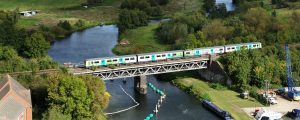 The UK Secretary of State for Transport Grant Shapps has inaugurated the trials of Britain first hydrogen train, HydroFlex, performed on the mainline railway.
The UK Secretary of State for Transport Grant Shapps has inaugurated the trials of Britain first hydrogen train, HydroFlex, performed on the mainline railway.
“As we continue on our road to a green recovery, we know that to really harness the power of transport to improve our country and to set a global gold standard we must truly embed change. That’s why I’m delighted that through our plans to build back better we are embracing the power of hydrogen and the more sustainable, greener forms of transport it will bring,” Grant Shapps said.
The start of operational testing is the culmination of almost two years development work and more than a GBP 1 million (more than EUR 1 milion) investment in HydroFlex by both Porterbrook and the University of Birmingham. A GPB 750,000 (EUR 822,456) grant was provided by the Department for Transport to develop the hydrogen powered train.
Porterbrook has announced at the end of September that plans to start putting HydroFlex into production, in response to customer demand.
Work on the next stage of HydroFlex is already well advanced with the University of Birmingham developing a hydrogen and battery power module that can be fitted underneath the production version of the train, which will create increased capacity for passengers in the train’s saloon area.
The HydroFlex train on test is a demonstrator unit, the production version will be configured for operation using both overhead-electric-wires and hydrogen for non-electrified routes. This will make the hydrogen train particularly attractive to regions and routes where there is only partial electrification of the network.
“Porterbrook is committed to innovation and the delivery of a carbon neutral and sustainable railway,” Mary Grant, CEO of Porterbrook said, adding that the production of the new train will create “the world’s first electric and hydrogen powered bi-mode rolling stock.”
The HydroFlex mainline testing programme has been supported by Innovate UK, who have provided funding to two of the development workstreams.
Other industry partners who have supported delivery of Britain first hydrogen train include Chrysalis Rail for installation work, Denchi Group for traction batteries, Ballard Power Systems for the fuel cell, Luxfer for hydrogen storage tanks, Fuel Cell Systems for hydrogen refuelling equipment. Other partners include Ricardo Rail for approvals support, Jeff Vehicles for engineering support on fuel cell control, SNC Lavalin for development of a new maintenance regime, DEU for supply of integration steelwork and miscellaneous installation materials, Aura for exterior livery design and dg8 for design and engineering support.
Share on:



